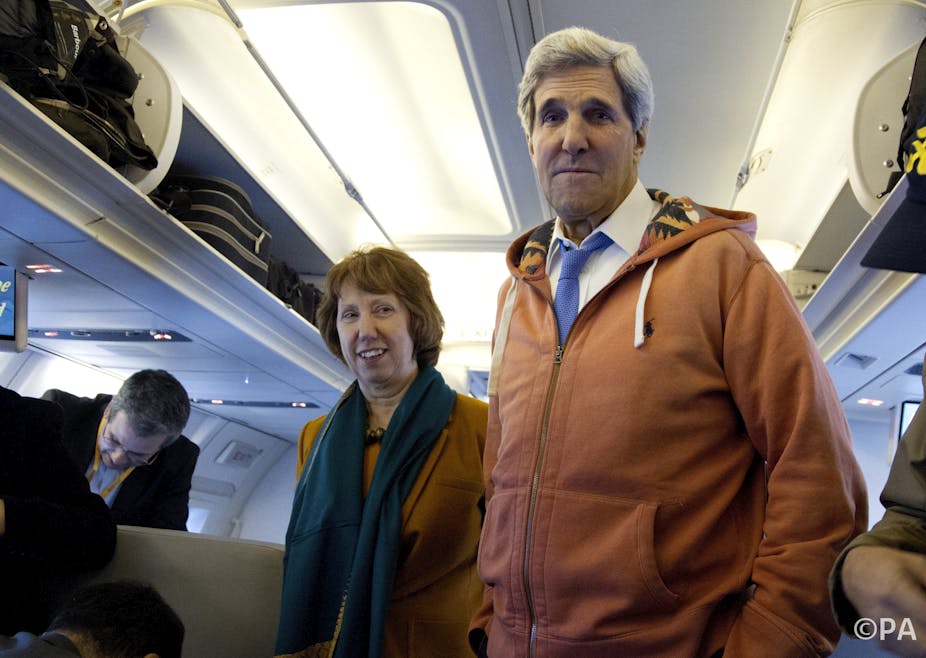The nuclear deal reached between the United States and Iran represents both a breakthrough and a risk for Barack Obama. A breakthrough because it stalls Iran’s progress towards nuclear weapons capability for six months, in exchange for only moderate concessions on sanctions, while a bigger final settlement is haggled over. The very existence of such extended high-level negotiations, let alone ones concluding in agreement, marks a high for US-Iran diplomacy after 34 years alternating between fiery acrimony and deep freeze.
It is also a risk, however, because Obama is certain to face a blistering assault from powerful opponents of any compromise with Iran. Having made this the main play in his quest for a diplomatic legacy he must now rely for vindication on Iran following through to deliver a comprehensive compromise agreement.
The foremost critic of the deal in its aftermath has been Israel’s prime minister, Benjamin Netanyahu, who immediately declared it an “historic mistake” which had made the world less safe. He did not want for vocal support within the United States, however, where a number of prominent Congressional figures lined up to express their scepticism. These included not only the usual suspects from the hawkish Republican ranks, but also some prominent Democratic Senators who had been spearheading a push for tightening the American sanctions squeeze against Iran still further.
Meanwhile, predictably, the most conservative voices among the foreign policy punditocracy reacted with apoplexy, one condemning the deal as “abject surrender” and predicting a (justified) military response from a betrayed Israel.
Power of Israeli lobby
This coincidence of views is usual. The politics of America’s Middle East policy has for many years featured a close intertwining of views between American hawks and the Israeli right, sharing as they do the view that revolutionary Iran is a toxic actor in international affairs, not to be negotiated with, only cowed and vanquished through punitive means. Meanwhile, a majority of Congress, including members with more moderate views in other policy areas, has tended to avoid at all costs divergence with Israel on those issues it identifies as core to its security.

This tendency, which has complex roots in both domestic politics and perceived shared national interests, is powerfully reinforced by the effective efforts of the “Israel Lobby”, whose effect on the political discourse has been mapped – controversially but not inaccurately – in detail by the political scientists John Mearsheimer and Stephen Walt.
The presence of these views means that for all the justified, if provisional, satisfaction currently felt within the Obama administration’s diplomatic team, there remains reason yet for some jangling of nerves. The worst-case scenario is that Israel might take matters into its own hands and carry out a military strike against Iran without American support. However, analysis from within Israel itself suggests that such a reckless and unilateral step is only an outside chance at least for now.

A more pressing fear, perhaps, is that those within the American political system who sympathise with Netanyahu’s analysis that a bad deal has been done may press ahead with their plans to vote through tougher sanctions against Iran when Congress reconvenes in December. The administration has already had to strain its political muscles to slow down Congressional progress towards this end while it pursued the most recent negotiations.
While this threat of an even tighter sanctions noose may have been a useful background threat during the latest round of talks, to have them inflicted now, in the context of what is supposed to be a period for confidence-building and reciprocity, would be disastrous for the administration’s diplomatic strategy.
Nevertheless, with Democratic senators Schumer and Menendez apparently determined to continue their push to escalate sanctions, and majority leader Harry Reid showing signs of willingness to allow them to do so, this must be a real fear.
Failure not an option
It seems plausible that at least some part of the Congressional critics’ initial hostility to the deal stems not just from its substance, but from chagrin that it appears to be the product of an extended project of secret diplomacy about which they were kept in the dark despite their attachment to the issue.
Once that sentiment has died down and the details have been examined more soberly, it may prove possible to convince enough of Congress – if not the most strident Iran hawks – to hold off on any new sanctions push at least long enough to see how the coming six months of further negotiations pan out. And in the final analysis, Obama always has his veto power as a last resort, though on such a white-hot political issue that would be a painful stretch indeed for a presidency not short on acrimony.
In making the case for circumspect and patient perseverance with his preferred diplomatic track, Obama has the advantage that his recommended course is the only one that holds out any hope whatsoever of a good ending in strategic terms. It has for a long time been clear that there are no good military options for trying to end Iran’s nuclear programme, and even if executed perfectly such an operation could achieve only a partial and temporary victory in setting back Iranian capabilities.
Meanwhile, the hawks’ alternative vision of how a hard-line diplomatic track might work – that the United States should tear up the current deal and inflict ever-harsher sanctions on Iran until the regime either collapses or declares unconditional surrender – shows all the hallmarks of ideology-tinted fantasy. If attempted, such a course would far more likely set the stage for degeneration into intractable stand-off and ultimately a war of unknowable consequence.
In the final analysis, then, the president’s best hope of winning provisional embrace of his deal and further time for diplomacy lies in the fact that among imperfect options it is the only sane and realistic course. But then perhaps relying on the realism of members of the present US Congress requires a triumph of hope over realism in itself.

